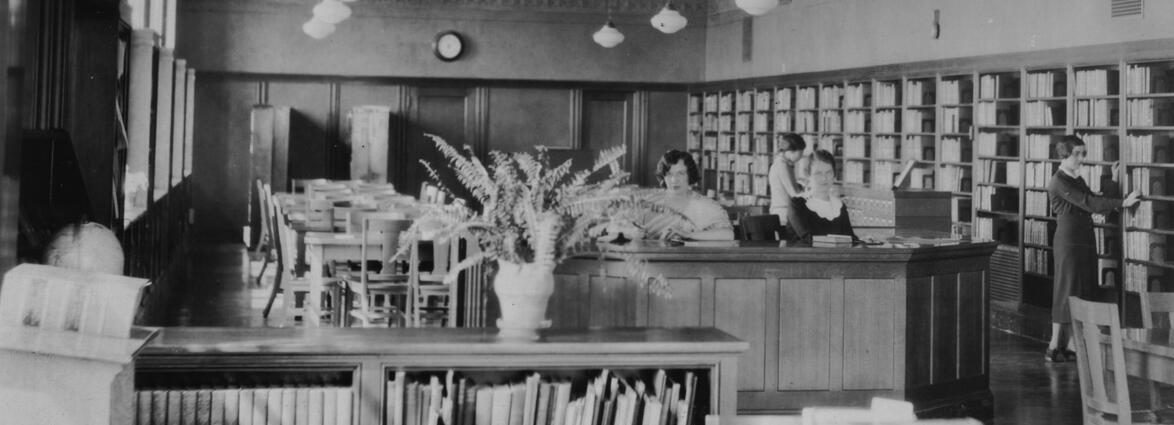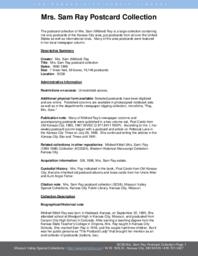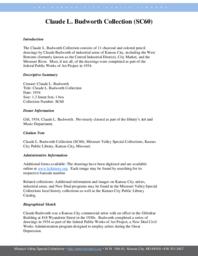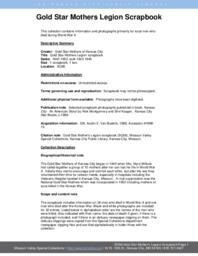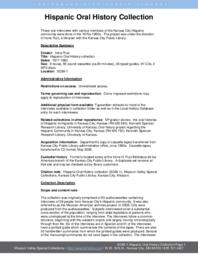The Presidents and Past Presidents Club of Greater Kansas City was formed in 1917 with Mrs. George W. Fuller as the first president. Membership was composed entirely of presidents and past presidents of women's clubs in Kansas City. The group did civic philanthropic work in Kansas City. This compilation contains typescript pages and illustrations including photographs. It contains signed vignettes and reminiscences concerning Kansas City, Missouri, history.
Native Missourian Loula Grace Erdman was a prolific author, writing primarily young adult historical fiction.The 336-page typewritten manuscript of the book "The Short Summer" is a work of young adult fiction with holographic corrections by the author in pen and pencil. Also included are photocopies of two articles from the "Kansas City Star" about the book and the author. A copy of the published book, which appears to have been taken from the library's circulating collection, is with the collection. First sheet of manuscript reads: "Working Manuscript The Short Summer By Loula Grace Erdman, 1958."
1958
James D. Allen settled in Shawnee, Kansas, in 1857 and was appointed Justice of the Peace for Shawnee, Johnson County, Kansas, that year. Collection contains one large journal and one small diary/account book that belonged to Allen.
1858 to 1872
The hundredth anniversary of the original incorporation of Kansas City was observed in 1950. A number of activities were held, culminating in a parade and pageant in the summer of 1950. Starlight Theater was built to accomodate the pageant. The scrapbook was assembled by the Kansas City Centennial Association during 1949-1950. It includes primarily the newspaper coverage of the event and some photographs and memorabilia.
1949 to 1950
This small, one-box collection is actually a compilation of various material divided between Kansas City history and Missouri history. Within the Missouri history section are numerous items pertaining to the Santa Fe Trail.
1906 to 1912
James F. Spalding, born July 28, 1835, was an early pioneer resident in Kansas City, arriving in 1865. According to his obituary, in October of that year founded the first school in Kansas City, two years before the first public school. It evolved later into Spalding's Commercial College, a business school. The collection contains a variety of textual material and artifacts. Spalding died on August 17, 1916, in Kansas City. (His death certificate reads August 18, 1916.)
1860 to 1950
Felice Lyne was born in Slater, Missouri, but received her early education and musical training in Kansas City. She achieved her greatest success in a number of operatic roles primarily in Europe, and her coloratura soprano voice was world-renowned. Miss Lyne died September 2, 1935, in Allentown, Pennsylvania. In November of 1935 she was re-interred at Forest Hill Cemetery in Kansas City, Missouri.
The collection contains photographs, newspaper clippings (loose and in scrapbooks), typewritten reviews of Miss Lyne's performances, sheet music, and assorted ephemeral material. A notable feature of the collection is the depth of newspaper coverage found in the loose and scrapbook clippings. Newspapers from around the world are included, and the clippings give a thorough printed account of the career of Miss Lyne at its peak. The scrapbooks have been photocopied. The following items accompanied the original donation, but were not found with the collection: a pair of boots; sheet music; and opera scores. Some of the sheet music was later found in the library's sheet music collection and added to this collection.
The collection contains photographs, newspaper clippings (loose and in scrapbooks), typewritten reviews of Miss Lyne's performances, sheet music, and assorted ephemeral material. A notable feature of the collection is the depth of newspaper coverage found in the loose and scrapbook clippings. Newspapers from around the world are included, and the clippings give a thorough printed account of the career of Miss Lyne at its peak. The scrapbooks have been photocopied. The following items accompanied the original donation, but were not found with the collection: a pair of boots; sheet music; and opera scores. Some of the sheet music was later found in the library's sheet music collection and added to this collection.
1908 to 1941
The Westminster Congregational Church, located at 36th and Walnut, Kansas City, Missouri, was dedicated at that address in 1907. It was initially called the Westminster Presbyterian Church but became affiliated with the Kansas City Congregational Union in 1901. The church closed in 1995. The collection includes seven scrapbooks, two church registers, and three envelopes of miscellaneous materials. Church bulletins, printed sermons, articles of incorporation, annual reports, pamphlets, magazine articles, and building fund material (1911) are in the collection. Numerous photographs are included, both color snapshots and black and white prints.
1900 to 1994
The Siegrist Engraving Company, located at 924 Oak, was founded in 1902 by Mr. Henry S. Siegrist. The collection has 35 etchings of notable Kansas City historical landmarks, including buildings, residences, and riverfront scenes. The etchings were promotional materials published and distributed by the Siegrist Engraving Company.
1936 to 1966
Mildred Kittell Ray was born in Halstead, Kansas, on September 22, 1895. An avid collector of postcards (buttons, too), Mrs. Ray, at the age of 72, initiated a column in the Kansas City Times and Kansas City Star entitled "A Postcard from Old Kansas City." The columns ran for 23 years. They proved to be extremely popular with the reading public, and two selected sets of articles were collected and published in book form; the first volume won a national design award from the American Institute of Graphic Arts. The collection consists of over 16,000 postcards and materials associated with Mrs. Ray's writing career. Subjects in the postcards include Kansas City, Missouri, Kansas, the other states of the US, a large number of foreign countries, an assortment of different topics (humor, holidays, etc.), and card format (wood, leather, copper, etc.). Items related to Mrs. Ray's career as a writer include: correspondence; research materials such as newspaper clippings and handwritten notes; draft, manuscript, and published versions of early "pre-postcard" historical articles; postcard articles that were rejected by the publisher; and the texts of lectures and presentations given by Mrs. Ray. Graphic materials make up another part of the collection, with items like advertising envelopes, ephemera from Emery, Bird, Thayer, and a number of photographs. An audiotape of a speech given by Dick Ray (Mrs. Ray's son), on February 13, 1998, at the official debut of the Library's online version of the newspaper column is included in the collection.
1890 to 1998
This collection of 49 boxes is arranged by imprint and state: Missouri, Kansas, and outside the local area and then by city, with the two largest groupings for Kansas City and St. Louis. Within the Kansas City arrangement is a separate category for Jenkins Music Company and for Charles Johnson. Local composers besides Charles Johnson include Scott Joplin, Carl Hoffman, Charles N. Daniels, and others. The type of music includes traditional music of the time period with emphasis on ragtime selections. The bulk of the music is published but there are some original, handwritten compositions. Also included are songs about Kansas City as well as sheet music covers with illustrations depicting Kansas City.
1880 to 1960 (year approximate)
The Claude L. Budworth Collection consists of 11 charcoal and colored pencil drawings by Claude Budworth of industrial areas of Kansas City, including the West Bottoms (formerly known as the Central Industrial District), City Market, and the Missouri River. Most, if not all, of the drawings were completed as part of the federal Public Works of Art Project in 1934.
1934
Mr. Deatherage founded the Deatherage Lumber Company in Kansas City in 1878. After retiring in 1919, he began a career as a historian, publishing his first volume of Kansas City history in 1928. Volumes two and three were never published. Mr. Deatherage died in 1939 in Kansas City, Missouri.The collection includes the handwritten manuscript of the final two volumes of the projected three-volume history of Kansas City, Missouri. Volume one was published in 1928 and titled: "Early History of Greater Kansas City Missouri and Kansas; The Prophetic City At the Mouth of the Kaw." The manuscript includes all of volume two, and a small portion of volume three. Volume two, entitled "Municipal History of Greater Kansas City, Missouri and Kansas," covering 1853-1928, is made up of 30 chapters. Subjects include city government, churches, hospitals, fraternal organizations, transportation, schools, cultural activities, parks and boulevards, and disasters. Volume three is unchaptered and includes information on the lumber trade, architects, expositions and fairs, the insurance business, livestock trade, and bridges. It was intended to be an industrial history of Kansas City, covering the same time period as volume two.
1930 (year approximate) to 1939 (year approximate)
The Vertical Files Special Collection is an artificial collection that was compiled in the mid-1990s when items in the regular vertical files were withdrawn for preservation purposes to be reprocessed as a special collection. This collection consists of pamphlets, reports, articles, correspondence, and ephemera for businesses, organizations, homes, buildings, and people in the Kansas City area.
1816 to 1990
This artificial collection contains approximately 100 programs of primarily national conventions of associations from throughout the United States held in Kansas City, Missouri, between the years 1903-1961. A few of the conventions were held in Kansas City, Kansas. The programs cover a wide range of organizations including agricultural, labor related, sports, home and retail, medical, educational, legal, religious, professional, and women's groups. The early convention programs include the Grand Army of the Republic, Missouri State Horticultural Society and the National Flower Show. One box has miscellaneous items such as newsletters, schedules, and brochures. Some of the larger programs may include photographs of Kansas City used to illustrate and promote.
1903 to 1961
Helen Siebert Thomes was born in Kansas City, Missouri, in 1884. She conducted the Helen Thomes School of Dancing for many years, retiring in 1942. Her first studio was located in Morton's Hall at Westport Road and Main. Other later locations included Drexel Hall at Linwood and Main and in a building she had built at 40th and Baltimore. She died in 1958.The collection consists of two scrapbooks, one of which contains 79 photographs. Many of these images of Miss Thomes's students are autographed and contain personal messages to her, taken circa 1915-1940. The second scrapbook contains ten photographs plus newspaper clippings, correspondence, programs for recitals, ephemera from a trip to Paris in 1914, dancing schedules, etc.
1910 (year approximate) to 1946 (year approximate)
This collection consists of various types of local fine arts programs and is designed to be an on-going collection. The programs are arranged alphabetically by either the theater name or place of performance, the fine arts series name, or the performing groups name. Individual plays, performers, producers, etc., are not indexed. The bulk of the programs cover the 20th century although there are a few late 19th-century ones. Most all of the programs are for Kansas City events, but some cover events in the greater metropolitan area. This collection is not all inclusive but does provide good coverage of the major fine arts events.
1880 (year approximate) to open end
Alfred Gregory, a local attorney, was born August 15, 1858, in Ann Arbor, Michigan, and died in Kansas City on May 15, 1946. His father was the first president of the University of Illinois. He had both an engineering and law degrees. He moved to Kansas City in 1889 and practiced law with Henry Beardsley. Josephine Karnes, daughter of J. V. C. Karnes, became his wife in 1892. Mr. Gregory loved to travel, visiting Europe often. He also was a lover of music and art. An account of Alfred Gregory's life can be found in the "Kansas City Bar Bulletin," V.23, #2, April 1947, p.11. These six scrapbooks are arranged chronologically, starting in 1875 and ending in 1927. It is believed that they belonged to Alfred Gregory and reflect his interests in the local arts, clubs, and professional activities. The pages primarily contain theater play bills, notices, and programs, as well as banquet menus for club and association events, newspaper clippings, cards, invitations, and other ephemeral items. The items particularly related to theater pertain not only to local but other American cities as well as international locales. Programs include orchestral, theater, and various types of musical performances including opera. There are a number of Knife and Fork Club menus as well as items pertaining to the Kansas City Bar Association. Early local theaters are well represented as well as events at Convention Hall and the Kansas City Symphony Orchestra.
1875 to 1927
Edith Lowe Peters appears to have been a long-time Kansas City resident, born in 1882 in Rock Port, Mo. Her father, Frank Lowe, was a local Kansas City figure known in law, church, and political circles. He was prosecuting attorney in Jackson County around the turn of the century. Edith married Howard H. Peters, local publisher and member of the Kansas City Park Board at one time. It is believed that she died in the 1970s. <br><br>The three scrapbooks in this collection are arranged by fine arts topics assigned by the compiler. Scrapbook #1 contains only newspaper clippings and features articles about local musicians covering the years 1911 to 1970. Starlight Theatre is given good coverage. Scrapbook #2, "Musical Programs, 1900-1929," contains not only programs and notices of local events, but also programs from Europe. The back of this scrapbook contains newspaper accounts of the Pepper Building fire which occurred in 1908 in downtown Kansas City and in which Edith Peters was involved. Scrapbook #3 also contains theater programs which include both foreign and local ones dating from 1901-1937. Programs include a variety of events including theater and musical performances.
1900 to 1970
This two-scrapbook collection covers the years 1905 to 1911 (volume 1) and 1903 to 1917 (volume 2). They include theater programs, play bills, club programs, and some miscellaneous items. Many of the theater programs and play bills are from other U.S. cities as well as European locations. The scrapbook compiler penciled in with whom they attended the performance. Local theater coverage is strongest for the Willis Wood Theatre, the Shubert Theatre, and the Fritschy Concert series. The original compiler of the scrapbooks is unknown. The donor was H. M. Sender, presumed to be Harry M. Sender, a local book dealer and collector of historical items. An article featuring Harry M. Sender can be found in the "Kansas City Journal," Aug. 3, 1939. Available in Special Collections newspaper clipping collection, mounted clips, filed under Sender's name.
1903 to 1917
William M. Paxton was born in Kentucky in 1819 and became a citizen of Platte County, Missouri, in 1839. Early in his life he was a lawyer, later becoming a merchant. Besides writing about the history of Platte County, he also wrote and published poetry as well as genealogy on his family. Upon his death at the age of 97, he was considered one of Platte County's most distinguished residents. <br><br>This bound, two-part printing of the "Annals of Platte County" was the author's own modified copy. The extra leaves inserted allowed Mr. Paxton to continue to write in information on the individuals included as well as attach various newspaper clippings to the pages. The clippings have no bibliographic information. In the back of Part II were added, supposedly by the author, handwritten additions to the index, some diary entries dated June 1897-March 1899, and various clippings. Many blank pages remain at the end of Part II. As far as known, this personal printing was never reprinted as a new edition of the history. The Platte County Historical and Genealogical Society published this extra information as an addendum in 2001 (MVSC Q 977.8135 P34 1897-1916).
1897 to 1916
The Gold Star Mothers of Kansas City began in 1945 when Mrs. Myra Willock first called together a group of 10 mothers after her son lost his life in World War II. Initially they met to encourage and comfort each other, but after the war they volunteered their time for veteran needs in hospitals. The scrapbook features the lives of 37 men from Kansas City or the immediate area, who except for one, were killed during World War II. The death dates cover from September 24, 1942, to October 20, 1952, a ten-year period. Each man's page contains a short history of his life, including his school and military history as well as his military honors and his place of burial. Also included are 32 photographs, mostly military portraits as well as a few snapshots. Many entries include poetry written by war mothers.
1942 to 1952
The collection is comprised of 65 audiocassettes (61 CDs) with interviews of 59 people from Kansas City's Hispanic community. Persons interviewed cover a substantial cross-section of the population, ranging from state legislators to persons who were unemployed at the time of the interview.
1977 to 1982
The collection is comprised of 97 audiocassettes containing interviews of 56 people, largely from Kansas City's African American community. Subjects interviewed primarily include political, business, religious, and community leaders. The interviews center on the history of the African American community in the Kansas City metropolitan area and focus on the individual's role in and perception of that history. The collection also includes the paperwork that accompanied the project, such as interviewer evaluations and contracts for both staff and interviewees.
1975 to 1976
The five oral histories in this collection were created as a pilot project which was to serve as the model for a larger Kansas City Regional History Project. The subjects of the oral histories were selected as representatives of either ethnic minorities or immigrant groups in Kansas City. Those interviewed include: Arthur Brand, Dr. Samuel U. Rodgers, Howard Sachs, Geneva Mingrone, and Rosalie Strada.
1988



